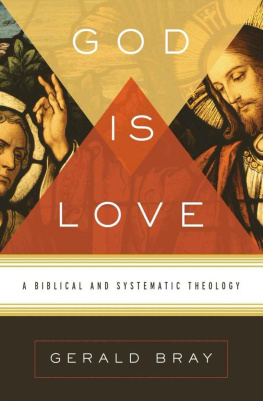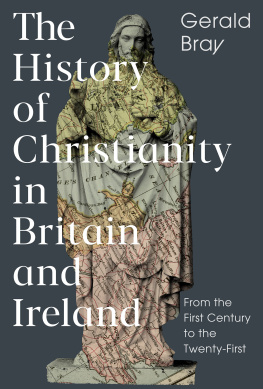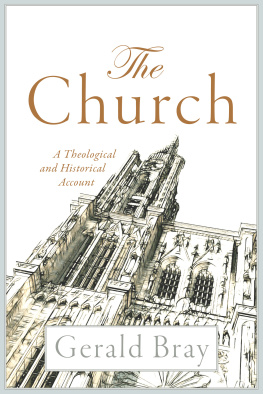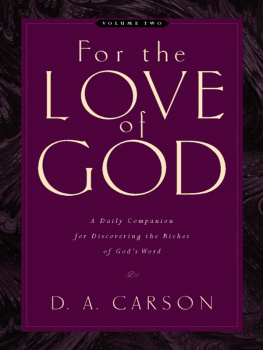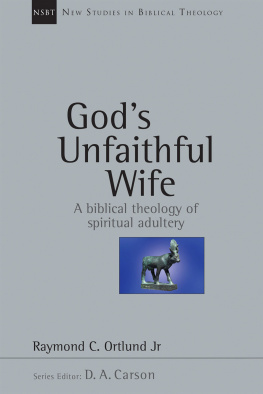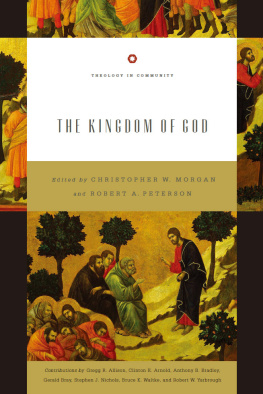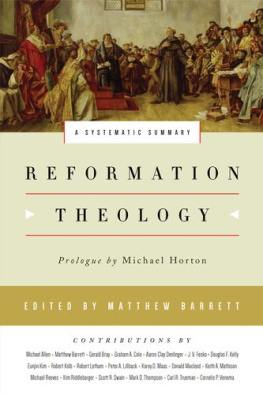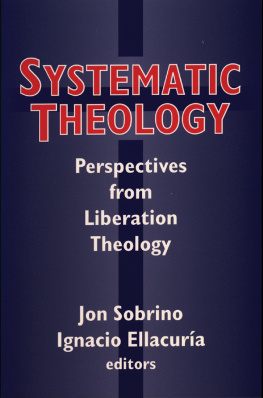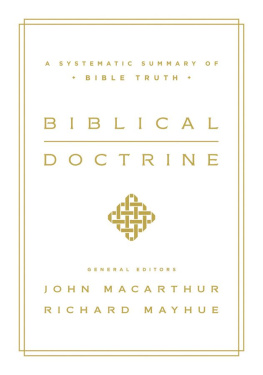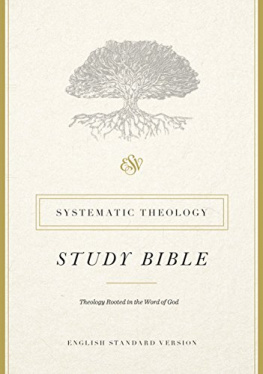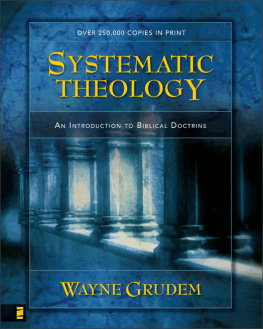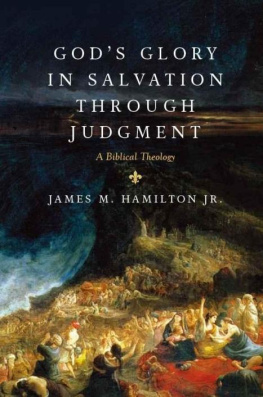Gerald Bray is one of our leading evangelical scholars and teachers and he has given us here a magisterial overview of Christian belief and doctrine. A great example of theology in the service of the church.
T IMOTHY G EORGE , Founding Dean, Beeson Divinity School; General Editor, Reformation Commentary on Scripture
Soaked in the depth and breadth of the Christian tradition, Gerald Bray brings a rich wisdom to his exceedingly accessible Systematic Theology. Freshly organizing his approach around love, Bray does not fall into cheap sentimentality, but instead carefully teases out the drama and story of divine love and how it should inform our understanding of countless areas of theology and life. Students and laity in particular will find this volume immensely helpful, and I heartily recommend it to all!
K ELLY M. K APIC , Professor of Theological Studies, Covenant College
Intimidated by theology books? This is the book for you. Here youll find a firm place to stand to take in the full panorama of Christian beliefcentered around the wonderful and worship-inspiring truth of the love of God, and firmly anchored in the sure and certain word of God. If youve read Lewiss Mere Christianity or Stotts Basic Christianity and you long to know more, then youre ready to move on to Gerald Brays God Is Love .
S TEPHEN J. N ICHOLS , Research Professor of Christianity and Culture, Lancaster Bible College; author, Welcome to the Story
God Is Love is a warm, conversational, and contemporary systematic theology written by one of evangelicalisms leading thinkers. But it is much more. It is biblically saturated, historically rooted theological wisdom for the people of God.
C HRISTOPHER W. M ORGAN , Dean, School of Christian Ministries, California Baptist University; editor, Suffering and the Goodness of God
Gerald Bray delivers on his promisehe teaches Christians about the God who is love and about the love that this triune God shows to others. He keeps this promise by pointing insistently to Gods gracious speech in the Bible, and by showing consistently how it all hangs together in the story of this God and his gospel. This book is a gripping lesson from a master teacher. For introduction to biblical doctrineits sources and its implicationsChristians will find no better aid than this new treasure.
M ICHAEL A LLEN , Assistant Professor of Systematic Theology, Knox Theological Seminary; author, Reformed Theology
God Is Love: A Biblical and Systematic Theology
Copyright 2012 by Gerald Bray
Published by Crossway
1300 Crescent Street
Wheaton, Illinois 60187
All rights reserved. No part of this publication may be reproduced, stored in a retrieval system, or transmitted in any form by any means, electronic, mechanical, photocopy, recording, or otherwise, without the prior permission of the publisher, except as provided for by USA copyright law.
Cover design: Faceout Studio
Cover image: Shutterstock
First printing 2012
Printed in the United States of America
Scripture quotations are from the ESV Bible (The Holy Bible, English Standard Version), copyright 2001 by Crossway. Used by permission. All rights reserved.
All emphases in Scripture quotations have been added by the author.
Hardcover ISBN: 978-1-4335-2269-7
ePub ISBN: 978-1-4335-2272-7
PDF ISBN: 978-1-4335-2270-3
Mobipocket ISBN: 978-1-4335-2271-0

Library of Congress Cataloging-in-Publication Data
Bray, Gerald Lewis.
God is love : a biblical and systematic theology / Gerald Bray.
p. cm.
Includes bibliographical references and index.
ISBN 978-1-4335-2269-7 (hc)
1. Theology, DoctrinalPopular works. I. Title.
BT77.B755 2012
230dc23 2011039137

Crossway is a publishing ministry of Good News Publishers.
SH 22 21 20 19 18 17 16 15 14 13 12
15 14 13 12 11 10 9 8 7 6 5 4 3 2 1
CONTENTS
PART ONE
THE LANGUAGE OF LOVE
PART TWO
GODS LOVE IN HIMSELF
PART THREE
GODS LOVE FOR HIS CREATION
PART FOUR
THE REJECTION OF GODS LOVE
PART FIVE
GOD SO LOVED THE WORLD
PART SIX
THE CONSUMMATION OF GODS LOVE
The book you hold in your hands is the fruit of many years of teaching theology to students in different parts of the world. It was a basic premise of the fathers of the early church and of the Protestant Reformers that the churchs doctrine should be drawn exclusively from the Bible, as the revealed Word of God. Sola Scriptura was their watchword, and the present volume tries to be as faithful to that precept as possible. Subjects not fully covered by the sacred text, like church government for example, are treated only briefly, and the position taken here is that such matters belong to the category of things indifferent.
The main purpose of this book is to set out what God has revealed to us. That revelation is sufficient for our needs but it is not exhaustive and we must not press things beyond what he has chosen to tell us. At the heart of Christian theology there lies a personal relationship with God. Like all personal relationships, it is based on a degree of knowledge undergirded by trust. What we do not know we leave to Gods judgment, because we believe that we can trust him to act in ways consistent with what he has told us. In human relationships we trust people all the time, even though we are fallible creatures and liable to disappoint others and be disappointed ourselves. How much more should we be prepared to trust God, who is infallible and will never let us down?
The Bible is the record of a relationship between God and man. It explains how God loves what he has made and wants us to enjoy the fruits of his creative acts in fellowship with him. But it also tells us how some of the highest creatures rebelled against him and rejected his love, and that the leader of that rebellion seduced the human race into following him. Out of this tragedy has come the message that God has not abandoned us but instead has revealed an even deeper love by sending his only Son to live our life, to die in our place, and to rise again from the dead so that we might dwell with him in eternity.
Centuries of experience and reflection have produced an enormous body of commentary that seeks to probe the meaning of the mystery of Gods love, giving rise to many controversies in the course of time. A companion volume to this one will address these things and show how one debate led to another. For the present, however, our aim is to show how Christian belief is firmly grounded in Gods Word, so that we may have a sure and comprehensive foundation for what we preach and proclaim. It is beyond the scope of this book to investigate the claims made for particular books to be included in Holy Scripture or the doubts raised against some of the canonical texts. What the ancients called the Hebraica veritas (the Hebrew Bible, or Old Testament) and the Christiana veritas (the New Testament) remain the foundation of our theology and have been treated as such here. Passages whose authenticity is open to doubt, such as Mark 16:920 or John 7:528:11, have not been used to support any doctrine, but this should not be understood as a denial of their canonical status. The attribution of particular books to named authors (such as Isaiah or Peter) is likewise respected, even when (as in the case of Matthew) there is no internal evidence to support it.
Next page
